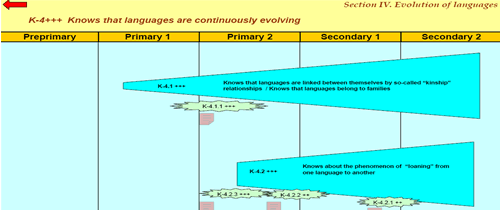These tables reproduce the lists of resources included in the CARAP reference document (knowledge, skills and attitudes) with an (approximate) indication of their relevance at different phases of the curriculum.

The resources are also featured as links in the Tables of descriptors across the curriculum. This structure provides a visual aid for exploring the framework. The graphical representation adopted situates resources along the learner’s curriculum.
(Note that the wording of some descriptors contained here may slightly differ from the definitive version. To be sure, compare with the up to date list of descriptors presented unter tab "Descriptors".)